MALDIVES
Coming of Age
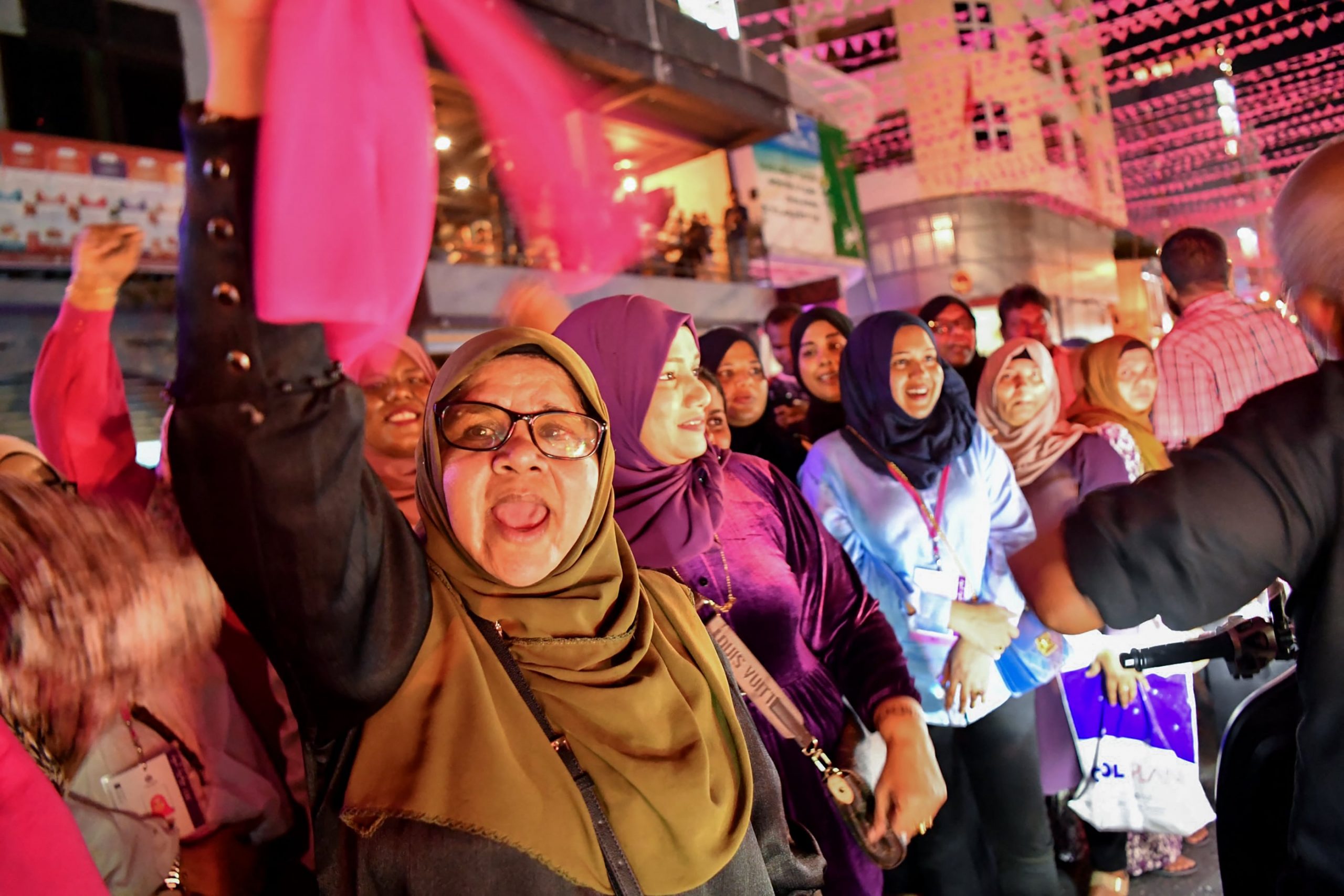
Supporters of newly elected President Dr. Mohamed Muizzu shout slogans along a street in Male on September 30, 2023, to demand the release of arrested Maldives’ former president Abdulla Yameen. President Muizzu took office with assurances of respect and support for the media, promising state funding, full compliance with requests for information, and the development of a media village to provide office space for newsrooms. Credit: Mohamed Afrah / AFP
In 2023, the Maldives marked a milestone on its democratic journey with the country’s fourth multi-party presidential election and peaceful transfer of power. A generation came of age with civil liberties. A decade and a half after freedom of expression was enshrined in the constitution, a campaign shadowed by geopolitics and fought in unfettered online spaces brought into sharp focus the role of the free press that emerged alongside the first political parties in 2005. Heading into polls in September 2023, however, the public blamed the media for gaping political divides. Partisan TV channels and online papers were seen as beholden to the political interests of their owners.
Before the last change of government in 2018, the media endured a troubled period during an authoritarian reversal under former president Abdulla Yameen. Rocked by a corruption scandal of historic proportions, Yameen’s government re-criminalised defamation in 2016, introducing hefty fines and imprisonment for journalists found guilty of slander. Armed with the draconian law, the broadcasting regulator imposed crippling fines on private stations, including USD 230,000 on the popular Raajje TV for allegedly defaming the president. As the political crisis deepened with all opposition leaders jailed or exiled, three Raajje TV journalists were found guilty of obstructing police duty during anti-government demonstrations, becoming the first journalists to be convicted in more than a decade.
On March 3, 2024, the Supreme Court overturned the High Court ruling and dismissed the ownership dispute at Haveeru, the country’s oldest newspaper. The paper was forced to shut down in April 2016 by a dubious High Court judgment that split the paper’s ownership and effectively banned publication. The dispute dated back to 1983 but the two alleged co-founders had failed to press their ownership claim for more than 35 years. Widely-held suspicions about the thin legal pretext and government influence over the judiciary to target the newspaper were vindicated eight years later.
Celebrating the apex court’s decision, the Maldives Journalists Association (MJA) – the de facto union of the local media fraternity – decried the injustice of Haveeru’s closure as a “dark stain” on the country’s history of media freedom. The MJA noted the acutely-felt loss of the newspaper’s archive that served as “a record of many decades of Maldives’ history”.
The Maldivian media had hoped for freer times with the election of President Ibrahim Mohamed Solih in November 2018. Key pledges were delivered early with the repeal of the defamation law. Bolstered by the ruling party’s parliamentary supermajority in 2019, the new administration entirely replaced the Supreme Court bench and reconstituted the seven-member Broadcasting Commission that handed down defamation fines. However, an evidence law passed in 2022 authorised courts to compel journalists to disclose their sources in cases related to “terrorism” and “national security,” overly broad categories rife with the potential for misuse.
There were no cases of murder or abduction of journalists by non-state actors. But progress stalled during the five-year term. The government failed to address a legacy of impunity and ensure justice as pledged. The most well-known cases are that of Maldives Independent (formerly Minivan News) journalist Ahmed Rilwan who was abducted in 2014 and blogger Yameen Rasheed who was stabbed to death in April 2017.
Solih’s defeat in the September 2023 election continued a losing streak for incumbent Maldivian presidents, none of whom managed to secure a re-election. The victory of Malé’s mayor as the opposition candidate revived fears over consolidating democratic gains as a new party founded by former president Yameen’s party came to power. But President Dr. Mohamed Muizzu took office with assurances of respect and support for the media, promising state funding, full compliance with requests for information, and the development of a media village to provide office space for newsrooms.
Despite falling out with Yameen, President Muizzu went on to gain control of the legislature in the April 2024 parliamentary elections. Together with pro-government independent MPs, the president’s party secured a supermajority of more than 70 seats in the 93-member house, enough to amend the constitution.
Media Rights Violations
Killings
Arrests
Heading into polls in September 2023, the public blamed the media for gaping political divides. Partisan TV channels and online papers were seen as beholden to the political interests of their owners.
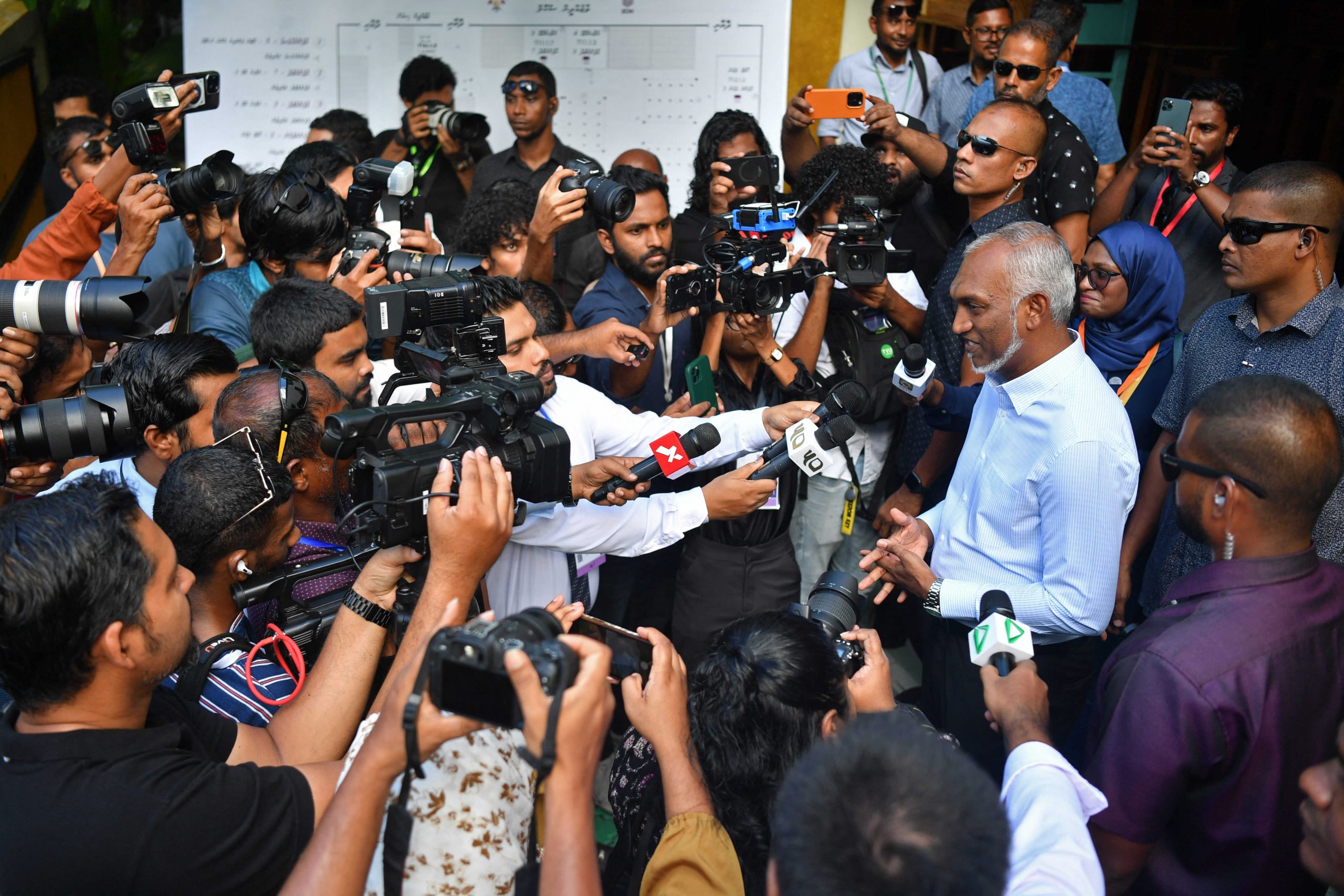
Maldives’ President Dr. Mohamed Muizzu (R) addresses the media after casting his ballot during the country’s parliamentary election, in Male on April 21, 2024. One month after his election, access to three anti-government websites, including one news outlet, was blocked, leading to protests and condemnations from the MJA and other media bodies. Credit: Mohamed Afrah / AFP.
Testing commitments
The new administration’s commitment to press freedom was soon put to the test. A month after President Dr. Muizzu was sworn in, three anti-government websites with allegedly incendiary content were blocked. The move followed a decision to block access to pornography for the first time.
The online crackdown sparked a fierce backlash. As opposition parties and civil society groups sounded the alarm, the MJA condemned “internet censorship with zero transparency” and insisted that a fundamental constitutional right such as freedom of speech could only be narrowed conditionally by an act of Parliament.
In the face of widespread criticism, the government spokesman repeatedly denied shutting down any registered media outlets. But internet service providers could only block access to specific websites on the orders of the Communication Authority of Maldives (CAM), an agency that operates under the Ministry of Local Government, Cities and Public Works. The MJA and rights groups objected to the lack of transparency as CAM neither discloses a list of blocked websites nor does it give reasons for blocking.
Despite the government’s denial of blocking any legitimate media, one of the blocked sites, Furathama.com, was found to be a registered outlet. The site was unblocked after 24 hours. Amid the backlash, top government officials met with representatives of the MJA and Editors Guild, who demanded restoration of access to the blocked sites, publication of a list of blocked sites, and assurances that the government would not resort to digital censorship without legal authority. All senior editors who participated in the meeting backed the proposals and the MJA sought assurances from the government as a show of good will.
However, without responding to the demands, the government proposed setting up a seven-member committee to formulate press freedom policies. Citing the lack of response, the MJA refused representation on the policy committee. As pressure continued to mount, the new government relented and unblocked the sites of the unregistered outlets.
The MJA welcomed assurances from the government that they would “stop exercising internet censorship to block free speech” and reiterated calls for clearer legal processes.
Both the MJA and Editors Guild stressed that the existing legal framework did not allow unilateral action by the government, which was advised to seek remedies through the self-regulatory mechanism of the Maldives Media Council (MMC). A 15-member body with members elected by media outlets and a mandate to investigate ethical violations from print and online media, the regulator’s oversight extends to misinformation from unregistered media outlets. The council’s Complaints Committee has the authority to bring parties to mediation and request corrections.
On February 15, 2024, the MMC assured action against three unregistered news sites in response to 16 complaints from the President’s Office and government ministries. Preliminary inquiries have flagged false information, the council said, assuring punitive action to be announced after the cases were concluded. The council’s members also approved formulating specific procedures for inquiries related to unregistered media outlets.
The MJA welcomed assurances from the government that they would “stop exercising internet censorship to block free speech” and reiterated calls for clearer legal processes.

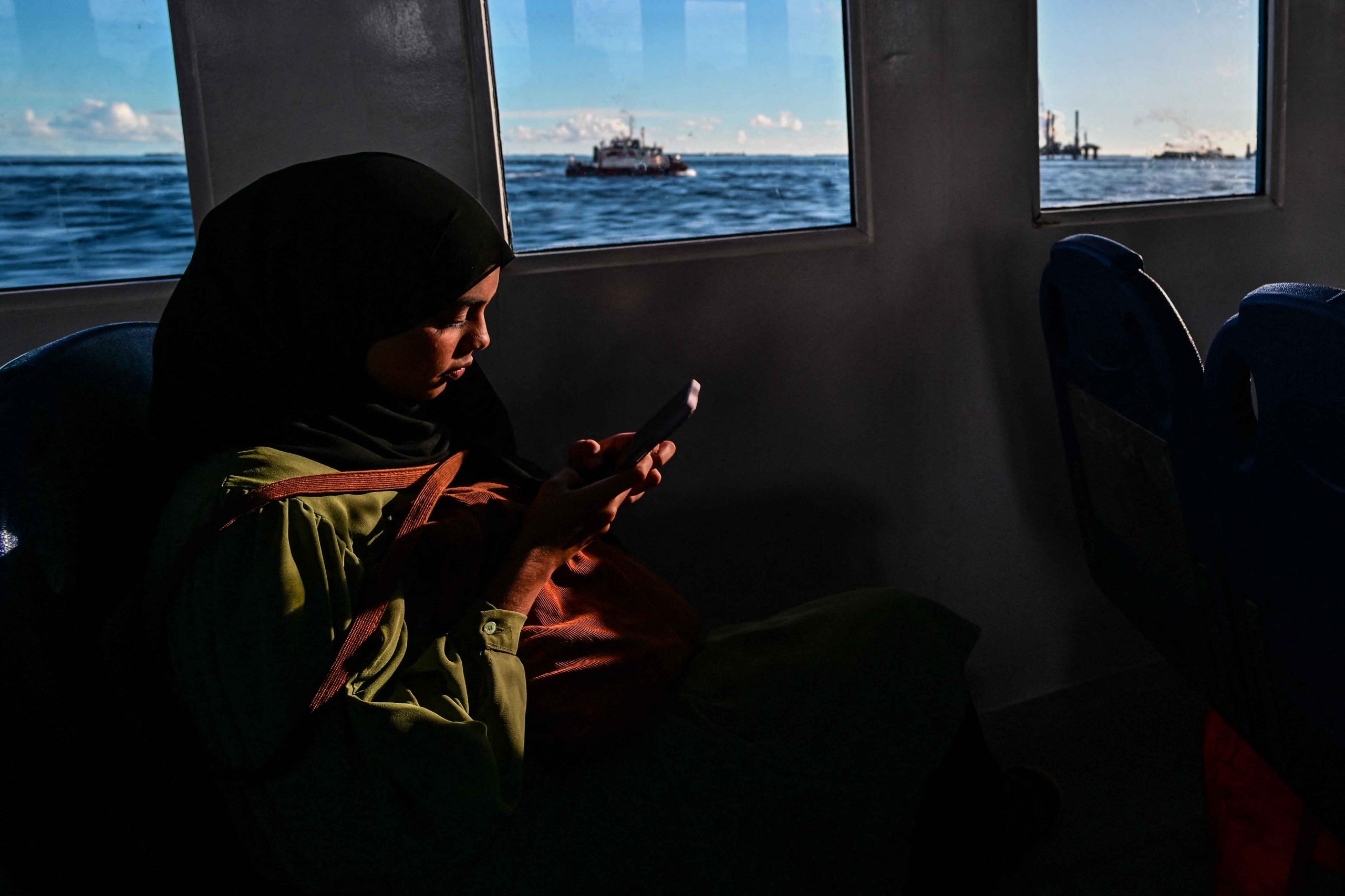
A girl uses her mobile phone during a ferry boat ride from Vilimalé island to Male on November 15, 2023. The archipelago’s media sector has made a strong transition to digital platforms, with Maldivians accessing news primarily through digital formats. Credit: Ishara S. Kodikara / AFP
Digital shift
In recent years, the Maldives media landscape has transitioned to digital platforms. A plethora of news websites in the local Dhivehi language – predominantly based in the capital Malé along with 40 per cent of the people – serves a resident population of 382,751 Maldivians. There are no community-based media or radio stations that cover local news from other islands scattered across the archipelago. But a handful of news websites operate out of a few of the more populous islands in the north and south. Along with a dozen television stations, the online outlets represent the primary source of news for the vast majority of Maldivians. Only one newspaper, Mihaaru, releases a daily print edition.
Of the 229 registered online media outlets, only 45 were considered to be active ahead of the September 2023 presidential elections. As of January 15, 2024, 19 daily news sites, journals, blogs and magazines were active and registered with the MMC. At the end of 2023, there were 233 accredited journalists with press passes issued by the Maldives Broadcasting Commission.
Of the 32 television and radio stations active by December 2023, the state media corporation, Public Service Media (PSM), operated seven TV channels and all four radio channels. The corporation’s PSM News channel functions as the state news agency. According to the broadcasting commission, there were 14 licensed TV channels that broadcast political content, two of which were operated by PSM and 12 were commercial private broadcasters.
Taking stock
Along with political polarisation and a lack of professional capacity in the young media workforce, financial reliance on state-owned enterprises (SOEs) has been a persistent factor hampering the growth of independent media in a competitive environment. Most privately-owned media houses depend on sponsorship and advertising revenue from SOEs, which is allocated without any transparency, oversight or merit-based process such as website visitor figures.
The recipients of SOE advertising include new and largely unknown websites with no readers. For mainstream outlets, the financial dependence on SOEs raises concerns over self-censorship. With advertising an unregulated sector, editors could be instructed to remove offending articles or desist from covering sensitive subjects.
On World Press Freedom Day, May 3, 2023, veteran Maldivian journalists gathered to take stock of the state of the media sector. A two-day panel discussion identified key challenges, including the reliance on SOEs, lack of legal protections for journalists, opaque funding sources, and a culture of secrecy.
As the Maldives continued to slide on global press freedom indices, journalists also gathered to protest in Malé’s artificial beach and assembled outside the President’s Office to hand over a letter outlining concerns. The failure to take action over death threats and intimidation against journalists was highlighted as a longstanding concern. Numerous incidents of police brutality against journalists over the years have gone unpunished, the journalists noted.
On July 20, 2023, Channel 13 cameraman Ahmed Misbah and Sangu TV journalist Maathu Hussain were roughed up by riot police while covering an opposition protest in Malé’s Republic Square. A video posted online showed the pair falling to the ground after a police officer grabbed and pushed the cameraman onto the Sangu TV journalist. Both wore official press cards that identified themselves as members of the media.
As the media community roundly condemned the incident, Police Commissioner Mohamed Hameed announced the suspension of the Specialist Operations police officer and promised an internal inquiry. The MJA called for an independent inquiry by the police watchdog National Integrity Commission. “It is imperative to establish a comprehensive national framework to safeguard journalists and formulate clear guidelines for media coverage of protests and gatherings,” the union advised.
The repeated incidents of journalists facing obstruction, harassment or assault while covering demonstrations underlined “the need for greater safety measures for media workers in the Maldives,” the International Federation of Journalists (IFJ) observed.
Along with political polarisation and a lack of professional capacity in the young media workforce, financial reliance on state-owned enterprises (SOEs) has been a persistent factor hampering the growth of independent media in a competitive environment.
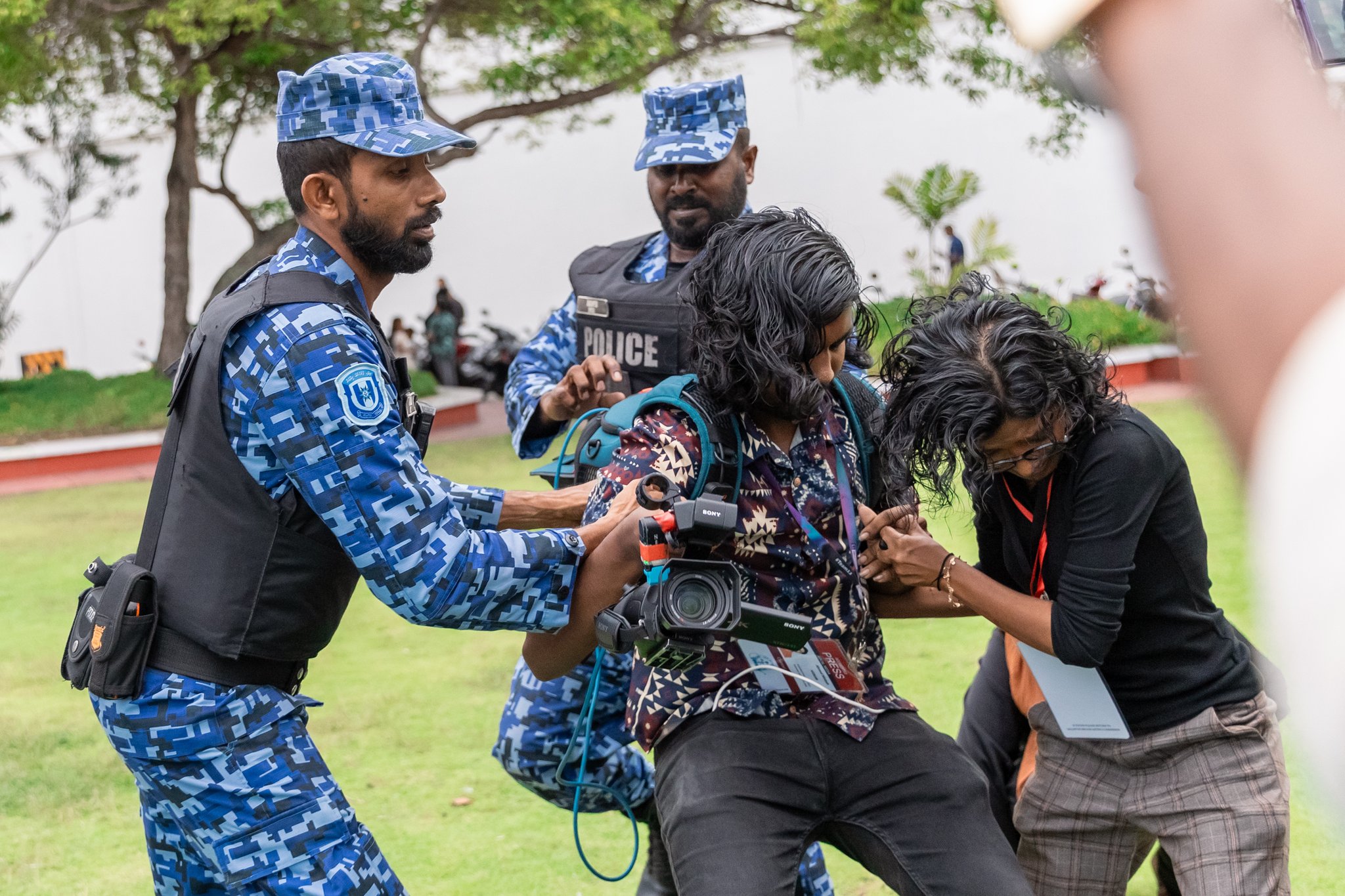
Channel 13 media worker Ahmed Misbah is pushed into Sangu News journalist Maathu Hussain by police while covering a protest in Malé on July 20. Crimes against journalists are often met with impunity, as authorities fail to hold those responsible to account. Credit: X
Justice delayed
Justice is rarely served after investigations of crimes against journalists, prolonging a culture of impunity. Only one person has been convicted to date over the torching of Raajje TV’s studio by a group of six masked men in October 2013.
On November 22, 2023, the criminal court dropped terrorism charges raised against three suspects accused of plotting the murders of journalist Ahmed Rilwan and blogger Yameen Rasheed. The three men had been arrested in June 2022 after a breakthrough by the presidential commission on deaths and disappearances. The abrupt dismissal of charges over alleged lack of evidence raises serious questions about the work of investigating authorities over the preceding years.
In a joint statement with the IFJ, Human Rights Watch and Reporters Without Borders (RSF), local rights groups expressed concern over the failure to publicise details of the investigation in the high-profile cases. “This, along with the fact that multiple governments have used these cases to further their political ambitions has led to a complete erosion of public trust in the investigation and judicial processes,” the statement read.
The prevailing impunity and failure to deliver justice “creates a chilling and fearful atmosphere for journalists and empowers the perpetrators of crimes against journalists,” the domestic and international groups warned.
The presidential commission is due to be dissolved on May 31, 2024. On the seventh anniversary of Yameen’s murder on April 23, 2024, the slain blogger’s family expressed disappointment with the failure to convict any suspects and called on the commission to publicly disclose its findings.
The commission previously identified the extremist group behind Rilwan’s abduction as an al-Qaeda affiliate that also “organised and financed” blogger Yameen’s murder in April 2017, the attempted murder of journalist Ismail Khilath Rasheed in June 2012 and the assassination of moderate religious scholar MP Afrasheem Ali in October 2012. The groups of radicalised young men believed that the victims deserved to be killed for apostasy or “insulting Islam.”
According to the commission’s findings, the body of missing journalist Rilwan was sunk after he was taken out to sea and beheaded. The commission accused the previous government of allowing six suspects to flee to Syria. Despite surveillance of Rilwan and intelligence information about threats to his life from Maldivian jihadis overseas and a local vigilante group that was targeting suspected atheists at home, the police failed to either protect Rilwan or alert him to the imminent danger.
The culture of impunity extends to abuse faced by women journalists. In two prominent cases of sexual harassment in 2020, neither of the alleged perpetrators – Avas Online’s veteran editor and the former communications secretary at the president’s office – faced any charges. More than a quarter of women journalists – who accounted for about 30 per cent of staff in mainstream outlets with a very low proportion in leadership roles – have faced sexual harassment, according to a report on gender equality in the media published by the MJA.
Public trust
As the presidential election approached and battle lines were drawn, journalists found themselves caught in the crossfire. In July 2023, representatives from the main opposition Progressive Congress Coalition and The Democrats – a breakaway of the ruling Maldivian Democratic Party – met the press after a third round of talks between the parties. Faced with difficult questions about their history of enmity, Ibrahim Shujau, vice president of the now-ruling People’s National Congress (PNC), and Hussain Amr, former managing director of the State Trading Organization (STO), accused journalists of taking payments and asking questions as directed by the President’s Office. He later apologised for his remarks. T
Following the confrontation, the MJA and MMC sternly condemned “attempts to discredit journalists with unfounded allegations.” The union called the “targeted harassment” of journalists completely unacceptable and encouraged the media to boycott such press conferences. The MMC said the most common complaint lodged with the council in recent weeks concerned baseless allegations publicly levelled against individual journalists. “[…] attempting to cause loss of confidence in credible journalists would harm the entire field of journalism as a result,” the MMC warned.
However, both the union and regulator conceded the need to enhance professionalism in the media, with sustained training and capacity building. The incident led many to wonder whether the public shared the opposition’s view of local journalists.
A study commissioned by the IFJ assessed for the first time how Maldivians consumed the news and whether they trusted the media. The ‘Unveiling Public Trust in the Maldivian Media’ report published in December 2023 presented the results of a survey of 667 households from 11 atolls and the Greater Malé Area.
According to the findings, 67 per cent of respondents read the news daily on online platforms, followed by 53 per cent who watched television news. Less than 10 per cent relied on newspapers, magazines or radio stations. A clear generational divide emerged in the data with only two per cent of respondents above 55 reading news websites. Facebook was the clear social media of choice for most Maldivians and the primary source of news for 64 per cent of people. Viber and Instagram were both at five per cent followed by Twitter at just three per cent.
In the most striking finding, 87 per cent of respondents held the media accountable for political divisions in the country with television and internet news websites perceived to have the highest levels of sensational or biased coverage. The vast majority of respondents believed that the ownership of TV stations and websites skewed or compromised coverage in favour of the owner’s business or political interests.
But there was also some cause for optimism. Most respondents reported rising levels of trust in the media over the past five years. A combined 82 per cent agreed that the Maldivian media was important for the creation of a stable democracy. More than half of respondents also believed that the media could play a vital role in healing political polarisation.
Based on the results, the IFJ and its local affiliate MJA recommended establishing a mechanism to ensure transparency in funding for media outlets alongside efforts to build media literacy, strengthen editorial independence, and promote stronger ethical standards through journalist training programmes.
The fact that multiple governments have used these cases to further their political ambitions has led to a complete erosion of public trust in the investigation and judicial processes.
The vast majority of respondents believed that the ownership of TV stations and websites skewed or compromised coverage in favour of the owner’s business or political interests.
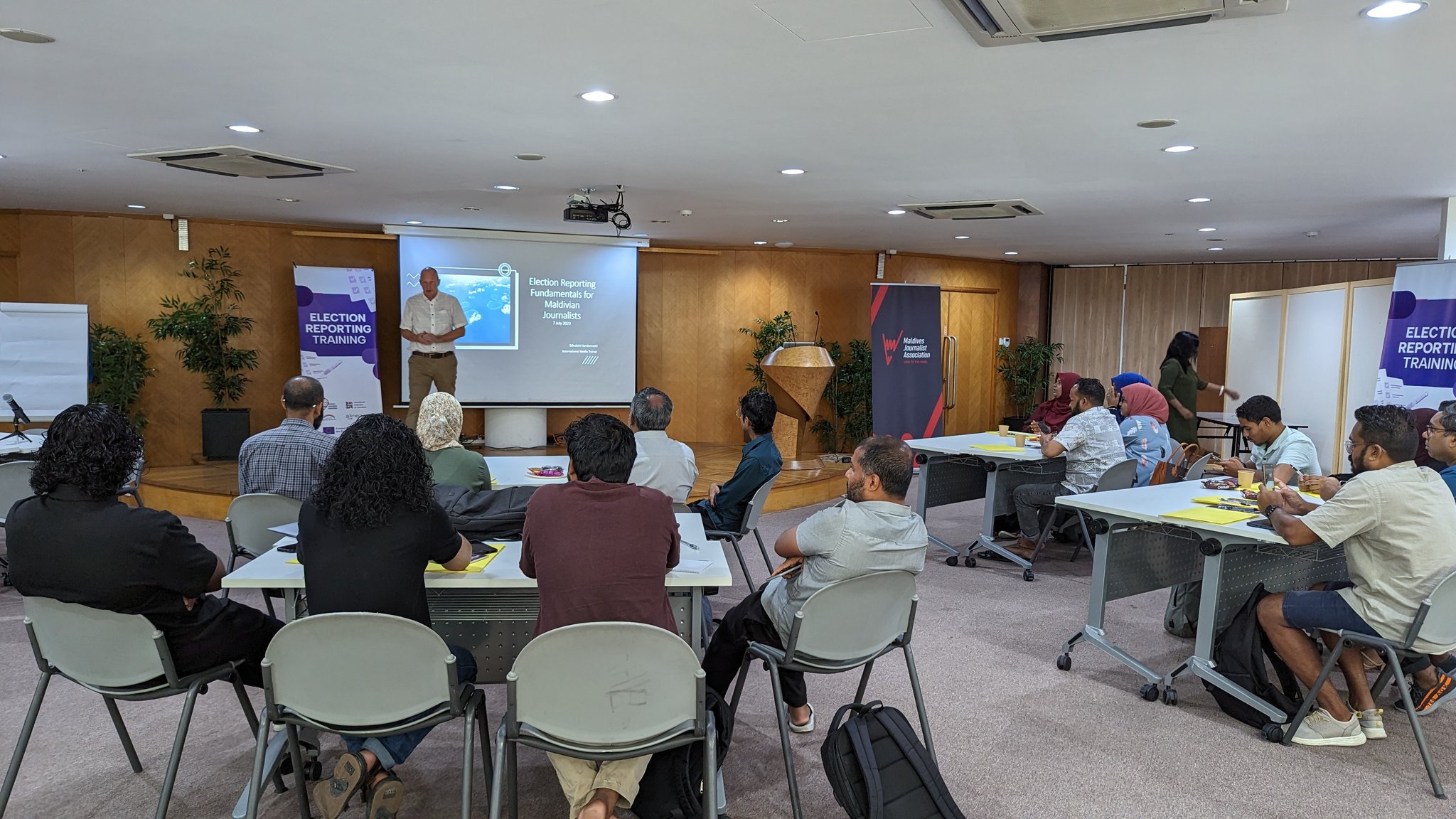
Journalists and MJA members attend an election reporting fundamentals workshop on July 7, 2023. Ahead of elections in September 2023, the MJA served a vital role in both increasing the impact of reporting, and ensuring respect for the media was upheld. Credit: MJA
A vote for democracy
In July, in the run up to the presidential elections in August and September 2023, MJA, with the support of IFJ and development consultancy Alinea, organised a day workshop aimed at providing journalists with essential election reporting skills. With a central theme of ethical reporting, the agenda including critical analyses of candidates’ manifestos and a focused approach to covering election-related issues. Notably, the Election Commission of the Maldives endorsed the workshop, with the Commissioner delivering a lecture on electoral processes.
The MJA also organised a two-day intensive investigative journalism workshop, designed for more experienced journalists and/or those journalists keen to pursue investigative reporting initiatives. The first program of its kind in the country, the specific emphasis was on investigative journalism in the context of elections. Participants were encouraged to consider potential investigations related to electoral integrity and accountability mechanisms.
Amid the first round of the Maldivian presidential elections on September 9, covered by hundreds of journalists and media monitors across the archipelago, the MJA continued to support journalists encountering harassment, restrictions, or other media violations through its media rights monitoring program. Journalists were encouraged to report any incidents to the team via a hotline or email to receive support, combatting the rise of harassment against the media by local authorities in the lead-up to the historic elections.
Disinformation blitz
As a country with an 85.8 per cent internet penetration and more than 70 per cent of the population active on social media platforms, the Maldivian public discourse in the buildup to the 2023 presidential election was vulnerable to misinformation and disinformation. The situation was further exacerbated by the absence of robust fact-checking mechanisms.
According to the public trust survey, the prevalence of “fake news” was perceived to be lower in traditional or “non-digital media outlets”. A whopping 68 per cent of respondents saw fake news as “prevalent” in social media and news produced by online papers. Nearly half of respondents thought fake news was prevalent in “sources or persons known only through the internet”.
The latter referred to anonymous users of X (formerly Twitter) with large followings who claim to be whistleblowers and crusaders exposing corruption. Despite the dominance of Facebook with 270,000 users, Twitter (120,000 users) plays an outsized role in the Maldives as the main arena for waging political battles and sounding the alarm on issues of public interest. A post on X is often the quickest route for seeking corrective action or public acknowledgment, as it is almost certain to elicit a prompt response from the concerned politician, public figure or state agency. Political parties, state institutions and civil society groups extensively utilise both Facebook and Twitter for campaigning and information dissemination. Online media outlets also use the social media platforms to push out their news articles.
In the absence of laws to govern social and digital media, coupled with the inability of Facebook or Twitter’s algorithms to detect violations of their terms of use in Dhivehi, threatening and abusive posts are commonplace in Maldivian social media spaces.
Ahead of the run-off election on September 30, 2023, “widespread information manipulation on social media questioned the integrity and sincerity of both candidates”, the European Union (EU) noted in a final report published after concluding a mission to observe the two rounds of the presidential election. As Solih and Muizzu’s campaigns turned negative, “both main parties exchanged unfounded claims and accusations,” it added.
The opposition’s campaign featured strong anti-Indian sentiments and centred on the presence of Indian military personnel with the online outlet Dhiyares conducting “a coordinated disinformation campaign” against the incumbent, the EU said.
Dhiyares was the source of 58 per cent of the misleading or manipulated election-related content monitored by the EU during the campaign period, followed by Raajje TV’s social media page (17 per cent), Adhadhu (8 per cent) and Channel 13’s media page (7 per cent).
Amid the increasingly bitter contest, both the Indian High Commission and Chinese embassy in Male’ condemned “fake news” spread by the Maldivian media amid fervent speculation of the Asian powers backing rival candidates. The Indian High Commission urged the Foreign Ministry and Media Council to “take suitable action against those responsible and guide the concerned media to write responsibly and ethically” and the Chinese embassy denied interfering in domestic affairs.
A quantitative and qualitative media monitoring exercise of four TV stations conducted by the EU’s mission meanwhile found “a clear imbalance and political bias, with the government and President Solih receiving most of the prime-time news coverage”. PSM News coverage of the president inaugurating development and infrastructure projects “blurred the line between election campaigning and presidential duties,” the monitoring observed. On the other hand, the opposition-aligned Channel 13 almost exclusively focused on the opposition coalition and Dr. Muizzu’s campaign.
Among private broadcasters, the pro-government Raajje TV’s editorial and news coverage favoured President Solih and portrayed Dr. Muizzu in a negative light, failing to offer live coverage of any of the opposition candidate’s campaign events. Conversely, Channel 13 portrayed the President negatively and ignored his campaign activities.
The findings were echoed by the Broadcasting Commission’s monitoring of TV content during the campaign, covering primetime content from 8pm to 12am on nine television channels from August 9, 2023 to the second round of voting on September 30, 2023. The commission found strong bias and favourable coverage from TV channels for particular candidates or political parties in their news and other programmes.
All broadcasters were legally obliged to provide equal time to political parties and candidates during the campaign in addition to Direct Access Airtime (free and paid airtime). Reflecting the overt political alignment of TV channels – most of which were perceived as media arms of parties – the monitoring report stated that the purpose of requiring direct access was not served as candidates did not seek airtime across all stations. Private media failed to adhere to equitable airtime mandated by the electoral law but PSM allocated free and paid time to all candidates. On September 2, 2023, the privately-owned Sangu TV co-organised with PSM a presidential debate with all eight candidates.
MJA, with the support of IFJ and development consultancy Alinea, organised a day workshop aimed at providing journalists with essential election reporting skills.
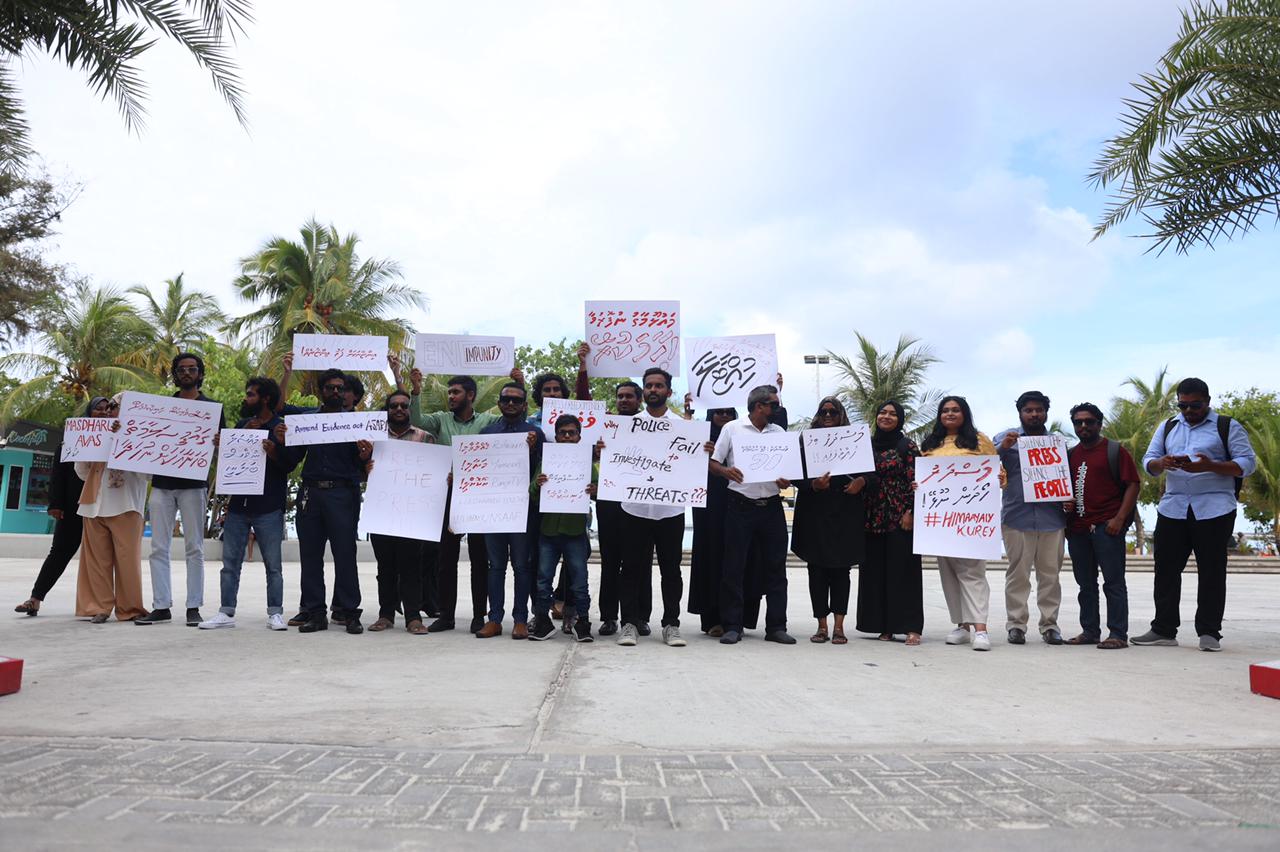
Members of the Maldives Journalists Association (MJA) demonstrate on Malé’s Artificial Beach on World Press Freedom Day, raising concerns over threats to press freedom through amendments to the country’s evidence act. Despite strong laws around Right To Information, struggles around legal implementation remain challenging. Credit: MJA
Slivers of light
Recent Maldives history shows that good laws do not guarantee good outcomes. The Right to Information (RTI) Act of 2014 was ranked the 22nd strongest RTI law in the world out of 138 countries. But not a single state institution was fully compliant until 2022, eight years after the law was enacted. Nearly half of the state institutions covered by the law did not have a functional website and less than 20 per cent of requested information was made easily available to the public, according to a study on proactive disclosure by Transparency Maldives and the Information Commissioner’s Office of Maldives (ICOM) in November and December 2023. “The failure to disclose information crucial to hold the state accountable may be indicative of a low level of understanding or acceptance of democratic principles by state institutions,” the report observed.
But the use of the law by both journalists and members of the public has been increasing in recent years. A total of 747 cases in 2022 and 2023 represented 69 per cent of cases since 2014. During 2023, 413 cases were submitted to ICOM as appeals against failure to comply with RTI requests, which was up 23 per cent from previous year.
Despite the new president assuring the media that filing RTIs would be unnecessary, the Information Commissioner revealed in April 2024 that almost 90 per cent of cases appealed to his office during the first quarter of the year involved complaints of government offices “not responding at all to RTI requests.” A total of 139 cases in the first three months of 2024 represented a 58 per cent increase from the same period last year.
Union power
As the new year dawned, Maldivian journalists and workers celebrated the passage of a long-awaited industrial relations bill. Ratified in January 2024, the new law guaranteed the right to take industrial action and form trade unions and introduced mechanisms for collective bargaining and dispute resolutions between workers and employers. A complementary occupational safety and health law put in place mechanisms for reducing workplace hazards, procedures for reporting workplace injuries and a system for filing complaints and seeking compensation.
The legislation was drafted with technical assistance from the International Labour Organization (ILO), more than a decade after the Maldives ratified eight ILO conventions. Parliament’s approval of the bills represented the culmination of years of campaigning and advocacy by the Maldivian trade union movement. The MJA was represented at a Maldives Trade Union Congress (MTUC) press conference that welcomed the passing of the bills in December 2023, calling it a “momentous union win” that was achieved after “a very long-standing strategic execution of plans led by workers and unions.”
With such constitutional guarantees and legal safeguards now firmly in place, all stakeholders must press for effective implementation to help steer journalism in the Maldives on the path to maturity, professionalism and independence.
